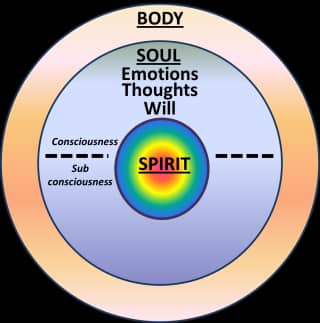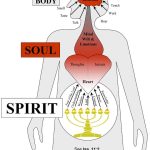TRICHOTOMY VS DICHOTOMY: THE BIBLICAL AND THEOLOGICAL SURVEY OF MAN’S COMPOSITION
- By Pastor Dele Ilesanmi, PhD
- Published in Christopress Blog

Text: Genesis 2:7:
“And the LORD God formed man of the dust of the ground, and breathed into his nostrils the breath of life; and man became a living soul.”

Introduction
The idea of tripartite or bipartite nature of man has generated a lot of arguments among the theologians, philosophers and scientists. This piece is not to join issues with anyone but to clarify issues through biblical and theological lens and establish facts after necessary juxtaposition. The question now is that: Are we made of two parts (body and soul) or three parts (body, soul, and spirit)? Dichotomy is a term which signifies a division into two parts: Body and Soul while Trichotomy is a term which signifies a division into three parts: Body, Soul, and Spirit. So, which view of man’s nature is correct: Is man of two or three parts? This is the main thrust of this piece/teaching.
- The Concept of Trichotomy and Dichotomy
Louis Berkhof explains, as cited by Joseph R. Nally, Jr, that “The tripartite conception of man originated in Greek philosophy, which conceived of the relation of the body and the spirit of man to each other after the analogy of the mutual relation between the material universe and God. No doubt, all Christians agree that God created us as a material (or physical) and immaterial (or spiritual) unity. But not all agree on the nature of the immaterial. Some argue that the immaterial dimension in human nature is divided into two distinct and separate faculties: soul and spirit. This view is from Trichotomists who believe man is made of three “parts” or “faculties”: the body, the soul, and the spirit. But the Dichotomists believe that the immaterial dimension cannot be so easily subdivided in this way. The soul, spirit, heart, mind, will, and affections are but different expressions for the variety of functions of the singular spiritual aspect of human nature. It should be note that “soul and spirit” are used many a time interchangeably and also seen as distinct and separate ontological entities in the Scriptures. This singular reason perhaps culminates in chasm, or rather nuance between the dichotomists and the trichotomists. In the view of Robert Reymond in his A New Systematic Theology of the Christian Faith. (Note, the original Hebrew/Greek words have been omitted), as cited by Joseph R. Nally, Jr, ‘The trichotomist must admit, along with the dichotomist and in agreement with Berkouwer, that there is a certain “imprecision” at times in the Bible’s use of the relevant terminology. One has only to consider the several New Testament quotations of Deuteronomy 6:5, for example, to see this. Where Luke 10:27 reads that we should love God with all our heart (kardia) and soul (psyche) and strength (ischys) and mind (dianoia), Matthew 22:37 reads that we should love God with all our heart and soul and mind, omitting strength, while Mark 12:30 reports that we should love God with all our heart and soul and mind and strength (reversing the order of the last two Lukan words), and in Mark 12:33 that we should love God with all our heart and understanding (syneseos) and strength, using another word for “mind” and omitting “soul” altogether. In all, five different words are employed without even mentioning the body. Surely, no one would insist, on the basis of these series of words connected by “and,” that each of these words refers to an immaterial, ontologically distinct entity, and that therefore Luke was a quintchotomist, Matthew was a quadchotomist, and Mark was a sexchotomist”(the emphases here are mine). With Berkouwer we must all admit that these parallel admonitions are simply saying that we are to love God with our entire or total being.
- Scriptural References for Trichotomy
- 1Thessalonian 5:23: “And the very God of peace sanctify you wholly; and I pray God your whole spirit and soul and body be preserved blameless unto the coming of our Lord Jesus Christ.” Here, man is trichotomous.
- 15:44: “It is sown a natural (psychikon) body; it is raised a spiritual body(pneumatikon, that is, a supernatural body). There is a natural body, and there is a spiritual body”
- 4:12:”For the word of God is quick, and powerful, and sharper than any twoedged sword, piercing even to the dividing asunder of soul and spirit, and of the joints and marrow, and is a discerner of the thoughts and intents of the heart.” Based on this passage, the view of Trichotomists that the immaterial dimension in human nature is divided into two distinct and separate faculties: soul and spirit. Therefore, the soul and the spirit of man are two distinct and separate ontological entities.
- Scriptural References for Dichotomy
The dichotomist affirms that the Bible teaches that man’s constituent elements are the material body and the immaterial soul (or spirit) – two ontologically distinct entities – which are in a mysterious, vital union and interact in what Berkhof calls the “union of life” (Louis Berkhof, Systematic Theology (Grand Rapids, Mich: Eerdmans, 1932, p. 195). In other words, he is neither pure matter alone nor pure spirit alone but a wonderful duality-in-unity and unity-in-duality. It should be noted that there are Bible verses that use the terms soul and spirit interchangeably such as Matthew 10:28; Luke 1:46–47; 1 Corinthians 5:3; 7:34. The scriptural support for this view includes the following verses:
Genesis 2:7: the Lord God formed man from the dust of the ground and breathed into his nostrils the breath [neshamah] of life, and man became a living being.
Ecclesiastes 12:7: The dust returns to the ground it came from, and the spirit returns to God who gave it. (This seems to be a commentary on Genesis 2:7.)
Matthew 10:28: Do not be afraid of those who kill the body but cannot kill the soul. Rather, be afraid of him who can destroy both soul and body in hell (emphasis added).
- The Biblical – Theological Position
ONE
This is not to suggest that Holy Scripture never intends any distinction in its usage of “spirit” and “soul.” H. D. MacDonald has nicely captured the nuanced distinction between “spirit” and “soul” when he writes:
However used, both terms refer to man’s inner nature over against flesh or body, which refers to the outer aspect of man as existing in space and time. In reference, then, to man’s psychical nature, “spirit” denotes life as having its origin in God and “soul” denotes that same life as constituted in man. Spirit is the inner depth of man’s being, the higher aspect of his personality. Soul expresses man’s own special and distinctive individuality. The pneuma is man’s nonmaterial nature looking Godward; the psyche is that same nature of man looking earthward and touching the things of sense (H. D. MacDonald, “Man, Doctrine of,” in Evangelical Dictionary of Theology, ed. Walter A. Elwell, Grand Rapids, Mich: Baker, 1984), 678).
TWO
The Bible teaches that humanity possesses a physical body, a soul, and a spirit. The distinction between the two immaterial aspects of the human nature (spirit and soul) is more difficult at times when used interchangeably in the Bible. Those who believe that human nature is a trichotomy typically believe the following:
“The physical body is what connects us with the physical world around us, the soul is the essence of our being, and the spirit is what connects us with God. This is why the unsaved can be said to be spiritually dead (Ephesians 2:1; Colossians 2:13), while they are very much physically and “soulishly” alive.”
“Those who believe that human nature is a dichotomy would have the same understanding of the body but would view the spirit as the part of the soul that connects with God. So, the question of dichotomy vs. trichotomy is essentially whether the soul and spirit are different aspects of the immaterial human nature, or if the spirit is simply a part of the soul, with the soul being the whole immaterial part of the human nature.”
THREE
Man has a spirit that reacted with the body to produce the soul.
Prov 20:27: “The spirit of man is the candle of the LORD, searching all the inward parts of the belly.”
Eccl 3:21 : “Who knoweth the spirit of man that goeth upward, and the spirit of the beast that goeth downward to the earth?”
Eccl 12:7: “Then shall the dust return to the earth as it was: and the spirit shall return unto God who gave it.” This means that the spirit, soul and body will be separated the moment death comes. Trichotomic view is again established here.
Zec 12:1 : “The burden of the word of the LORD for Israel, saith the LORD, which stretcheth forth the heavens, and layeth the foundation of the earth, and formeth the spirit of man within him.”
1 Cor 2:11 For what man knoweth the things of a man, save the spirit of man which is in him? even so the things of God knoweth no man, but the Spirit of God.
FOUR
The problem may arise whether man is of three parts or not when the words “soul” and “spirit” are used interchangeably in the Scripture. For example, Jesus says that his soul is trouble (Jn. 12:27), but a few verses later, we read that he became “trouble in spirit” (Jn. 13:21). Likewise, Jesus mother says, “My soul exalts the Lord, 47 And my spirit has rejoiced in God my Savior” (Lk. 1:46-47). Moreover, dead believers can either be called “spirits” (Heb. 12:23) or “souls” (Rev. 6:9; 20:4). At death, either the “soul” departs the body (Gen. 35:18; 1 Kings 17:21; Isa. 53:12; Lk. 12:20) or the “spirit” departs (Lk. 23:46; Eccl. 12:7; Jn. 19:30; Acts 7:59). The “spirit” knows an individual (1 Cor. 2:11); therefore, the soul and spirit perform the same function and remain one ontological entity when used interchangeably (http://www.evidenceunseen.com/theology/anthropology/trichotomy-or-dichotomy/)
- Textual Analysis of Genesis 2:7: A Theological Position
“And the LORD God formed man of the dust of the ground, and breathed into his nostrils the breath of life; and man became a living soul.”
Watchman Nee’s theological position is that: “When God first created man He formed him of dust from the ground, and then breathed “the breath of life” into his nostrils. As soon as the breath of life, which became man’s spirit, came into contact with man’s body, the soul was produced. Hence the soul is the combination of man’s body and spirit. The Scriptures therefore call man “a living soul.” The breath of life became man’s spirit; that is, the principle of life within him.”
The inbreathing of God produced a two-fold life: soulical and spiritual. In other words, the immaterial dimension in human nature is divided into two distinct and separate faculties: soul and spirit. “When the inbreathing of God entered man’s body it became the spirit of man; but when the spirit reacted with the body the soul was produced. This explains the source of our spiritual and soulical lives. We must recognize, though, that this spirit is not God’s Own life…” In Job33:4 “The Spirit of God hath made me, and the breath of the Almighty hath given me life.” (cf. Gen.2:7). The spirit of man is different from the Holy Spirit. “Formed man of dust from the ground” refers to man’s body; “breathed into his nostrils the breath of life” refers to man’s spirit as it came from God; and “Man became a living soul” refers to man’s soul when the body was quickened by the spirit and brought into being a living and self-conscious man. A complete man is a trinity, the composite of spirit, soul and body. According to Genesis 2.7, man was made up of only two independent elements, the corporeal and the spiritual; but when God placed the spirit within the casing of the earth, the soul was produced. The spirit of man touching the dead body produced the soul. The body apart from the spirit was dead, but with the spirit man was made alive. The organ thus animated was called the soul.”
“This trinity of spirit, soul and body may be partially illustrated by a light bulb. Within the bulb, which can represent the total man, there are electricity, light and wire. The spirit is like the electricity, the soul the light, and body the wire. Electricity is the cause of the light while light is the effect of electricity. Wire is the material substance for carrying the electricity as well as for manifesting the light. The combination of spirit and body produces soul, that which is unique to man. As electricity, carried by the wire, is expressed in light, so spirit acts upon the soul and the soul, in turn, expresses itself through the body.”
However, we must remember well that whereas the soul is the meeting-point of the elements of our being in this present life, the spirit will be the ruling power in our resurrection state. For the Bible tells us that “it is sown a physical body, it is raised a spiritual body” (I Cor. 15.44). Yet here is a vital point: we who have been joined to the resurrected Lord can even now have our spirit rule over the whole being. We are not united to the first Adam who was made a living soul but to the last Adam Who is a life-giving spirit (v.45).
- Facts About The Spirit, Soul and Body
“Through the corporal body man comes into contact with the material world.
“The soul comprises the intellect which aids us in the present state of existence and the emotions which proceed from the senses.
“The spirit is that part by which we commune with God and by which alone we are able to apprehend and worship Him.
“The soul is the meeting point of spirit and body, for there they are merged.
“By his spirit man holds intercourse with the spiritual world and with the Spirit of God, both receiving and expressing the power and life of the spiritual realm.
“Through his body man is in contact with the outside sensuous world, affecting it and being affected by it.
“The soul stands between these two worlds, yet belongs to both. It is linked with the spiritual world through the spirit and with the material world through the body. It also possesses the power of free will, hence is able to choose from among its environments.
“The spirit cannot act directly upon the body. It needs a medium, and that medium is the soul produced by the touching of the spirit with the body.
“The soul therefore stands between the spirit and the body, binding these two together. The spirit can subdue the body through the medium of the soul, so that it will obey God; likewise the body through the soul can draw the spirit into loving the world.
“The spirit is the noblest for it joins with God.
“The body is the lowest for it contacts with matter.
“The soul lying between them joins the two together and also takes their character to be its own. The soul makes it possible for the spirit and the body to communicate and to cooperate. The work of the soul is to keep these two in their proper order so that they may not lose their right relationship.
“The spirit is the noblest part of man and occupies the innermost area of his being.
“The body is the lowest and takes the outermost place.
“Between these two dwells the soul, serving as their medium.
“The body is the outer shelter of the soul, while the soul is the outer sheath of the spirit. The spirit transmits its thought to the soul and the soul exercises the body to obey the spirit’s order. This is the meaning of the soul as the medium. Before the fall of man the spirit controlled the whole being through the soul…” (See Watchman Nee: http://articles.ochristian.com/article1935.shtml Retrieved on 25/7/20)
Conclusion
Trichotomy vs. dichotomy of man—which view is correct? It would seem that it is unwise to be dogmatic. Both theories are biblically plausible. Neither interpretation is heretical. This is perhaps an issue we are unable to fully grasp with our finite human minds. What we can be certain of is that the human nature is comprised of a body, a soul, and a spirit. Whether the soul and spirit are one, or are somehow distinct is not an issue. God makes it abundantly clear in His Word that man has a body, a soul, and a spirit (Gen 2:7; 1Thess 5:23). Whether you believe in a dichotomy or trichotomy, offer your body as a living sacrifice (Romans 12:1), thank God for saving your soul (1 Peter 1:9), and worship God in spirit and truth (John 4:23–24). Sing this song if you been saved: Thank you for saving me thank you my Lordx2
Endnote
Dr. Joseph R. Nally, Jr., D.D., M.Div. is the Theological Editor at Third Millennium Ministries (Thirdmill). https://thirdmill.org/answers/answer.asp/file/40572 23/7/20
http://www.evidenceunseen.com/theology/anthropology/trichotomy-or-dichotomy/
- D. MacDonald, “Man, Doctrine of,” in Evangelical Dictionary of Theology, ed. Walter A. Elwell, (Grand Rapids, Mich: Baker, 1984), 678.
Watchman Nee: http://articles.ochristian.com/article1935.shtml Retrieved on 25/7/20
Share this:

